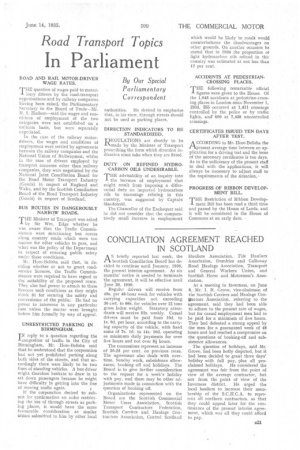Road Transport Topics
Page 31

If you've noticed an error in this article please click here to report it so we can fix it.
In Parliament
By Our Special Parliamentary Correspondent
ROAD AND RAIL MOTOR-DRIVER WAGE RATES.
THE question of wages paid to motor1lorry drivers by the road-transport organizations and by railway companies having been raised, the Parliamentary Secretary to the Board of Trade—Mr. R. S. Hudson—said the wages and conditions of employment of the two categories were not established on a uniform basis, but were separately negotiated.
In the case of the railway motordrivers, the wages and conditions of employment were settled by agreements between the railway companies and the National Union of Railwaymen, whilst in the case of drivers employed by transport concerns other than railway companies, they were negotiated by the National Joint Conciliation Board for the Road Motor Transport Industry (Goods) in respect of Englandand Wales, and by the Scottish Conciliation Board of the Road Transport Industry (Goods) in respect' of Scotland.
BUS ROUTES IN DANGEROUSLY NARROW ROADS.
THE Minister of Transport was asked by Sir Wm. Edge whether he was aware that the Traffic Commissioners were sanctioning bus routes along country roads which were too narrow for other vehicles to pass, and what was the policy of the Department in respect of ensuring public safety under these conditions.
Mr. Hore-Belisha said that, in deciding whether or not to grant roadservice licences, the Traffic CQMMiSsioners were required to have regard to the suitability of the proposed route. They also had power to attach to these licences such conditions as they might think fit for securing the safety and convenience of the public. He had no power to intervene in any particular case unless the matter were brought before him formally by way of appeal.
UNRESTRICTED PARKING IN BIRMINGHAM.
TN reply to a question regarding the -Lcongestion of traffic in the City of Birmingham, Mr. Hore-Belisha said that he understood that the corporation had not yet prohibited parking along both sides of the streets, and that accordingly there were likely to be two lines of standing vehicles. A bus driver might therefore hesitate to draw in to set down passengers because he might have difficulty in getting into the line of moving traffic again.
If the cOrporation desired to submit for confirmation an order restricting the use of through streets as parking places, it would have the same favourable consideration as similar otders submitted to him by other local authorities. He desired to emphasize that, in his view, through streets should not be used as parking places.
DIRECTION INDICATORS TO BE STANDARDIZED.
"-'-made are shortly to he
de by the Minister of Transport prescribing the form which direction indicaters must take when they are fitted.
DUTY ON REFINED HYDROCARBON OILS UNDESIRABLE.
THE advisability of an inquiry into the increase of employment that might result from imposing a differential duty on imported hydrocarbon oils to encourage refining in this country, was suggested by Captain Macdonald.
The Chancellor of the Exchequer said he did not consider that the comparatively small increase in employment which would be likely to result would counterbalance the disadvantages on other grounds. On another occasion he stated that in 1934 the proportion of light hydrocarbon oils refined in this country was estimated at not less than 12 per cent.
ACCIDENTS AT PEDESTRIAN. CROSSING PLACES.
THE following remarkable official figures were given to the House. Of the 1,045 accidents at pedestrian-crossing places in London since November 1, 1934, 355 occurred at 1,411 crossings controlled by the police or by traffic lights, and' 690 at 7,438 uncontrolled crossings.
CERTIFICATES ISSUED TEN DAYS AFTER TEST.
A CCORDING to Mr. Hore-Belisha the t–kpresent average time between an application for a driving test and the issue of the necessary certificates is ten days. As to the sufficiency of the present staff to deal with the applications, it will always be necessary to adjust staff to the requirements of the situation. •
PROGRESS OF RIBBON DEVELOPMENT BILL.
THE Restriction of Ribbon Develop-Iment Bill has been read a third time and passed by the House of Lords, and it will be considered in the House of Commons at an early date.




















































































